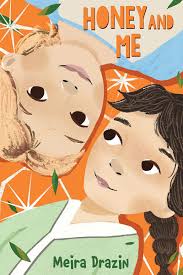Honey and Me – Meira Drazin
Scholastic Press, 2022

In a reversal of sorts, I would like to start my appreciation of Meira Drazin’s middle-grade (and older) novel with her thoughtful author’s note. She raises the somewhat contentious issue of identity in children’s books. Do we only relate to characters who duplicate, at least in some key ways, ourselves, or do works of literature transcend that type of categorization? Like Meira Drazin, I’m Jewish, and I grew up reading books in which Jewish characters rarely appeared. I loved those books—Little Women, Anne of Green Gables, Noel Streatfeild’s work—so I appreciated Ms. Drazin’s mention of them as touchstones.
However, I also loved and was greatly impacted by, Sydney Taylor’s All-of-a-Kind series, which I have written about in this blog, and for several other publications (see, for example, here and here and here and here). What Jewish girl did not? Actually, I bet there were some, and maybe now Taylor’s books, with their glow of nostalgia, seem too distant to some Jewish readers. Of course, Ella, Henny, Sarah, Charlotte, and Gertie, like Meg, Jo, Beth, and Amy, reach out to any reader, regardless of ethnicity, race, or gender. Honey and Me is a thoroughly original work, and also an homage to books about friendship, books about girls, books about imperfect families, and just…books.
Milla Bloom and Honey Wine are best friends. (Their names are among the best devised in modern children’s books.). They are both Orthodox Jews, but here is where identity creeps in. Some readers will bring to the book their knowledge of what it means to be Orthodox in the Jewish world today, but others will not, and Drazin lets them know without lengthy explanations. Milla’s family integrates more aspects of modernity into their practice, while the Wines approach Judaism more traditionally. There is virtually no judgment about this difference in the novel. Honey’s family is larger than Milla’s. Honey has a brother on the autism spectrum. Milla has an independent and creative aunt who needs the find the right guy. Honey’s mom seems almost perfect to Milla, a paragon of steadfastness and enveloping love. Milla’s own mom is complicated. She made sacrifices for her career and she had some difficulties with becoming a mother.
The exploration of friendship in the novel is deep. It’s not a mean-girls story, or one about competitiveness with a facile resolution. In fact, the girls in this book are really nice! Siblings are supportive, but also annoying. There are some wonderful teachers in the girls’ school. Feminism is an undercurrent, and it comes up against Jewish tradition but, at the same time, finds opportunities within that tradition. Anne Shirley came up against some implicit gender bias, right from the moment when Mathew and Marilla are disappointed that she is a girl. Remember when Charlie is born, and Papa finally has a son? Or when Aunt Lena and Uncle Hyman celebrate the birth of their first son with a pidyon ha-ben ceremony? (link to my article). (If you haven’t read the All-of-a-Kind books, this would be a good time to start.). To celebrate become Jewish adults with their bat mitzva, both girls engage with Jewish texts. Honey reads from the Megillah (Book of Esther) in front of other women. In the context of her own family, she is pushing boundaries. If readers expect that women should have no limits on public recitation of Torah, they may feel both pride, and disappointment at both the limits and expansion of women’s roles. Authors write books not principally to reassure, but to challenge.
The dysfunctional family seder scene is particularly terrific. Drazin acknowledges that holiday celebrations are not always moments of unmitigated joy. Sometimes children leave the table in tears and a mother “sits in stony silence.” Even if it is one moment in time, it may feel like an eternity. I recommend reading Honey and Me and returning to some of the fertile sources for Drazin’s unforgettable characters. This novel is not an homage to Sydney Taylor, nor is at an intellectual demonstration that Orthodox Jewish girls have inner lives. But within the richness of her book, Drazin has brought in those precedents and allowed them to take their own direction.

One thought on “Your Friends Are Not Your Family”